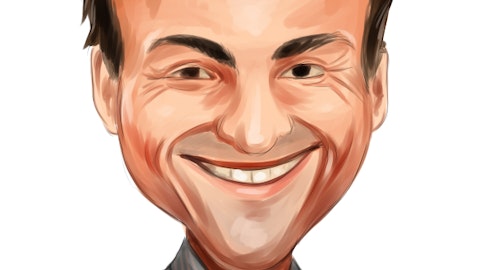Civeo Corporation (NYSE:CVEO) Q3 2023 Earnings Call Transcript October 27, 2023
Civeo Corporation beats earnings expectations. Reported EPS is $0.61, expectations were $0.21.
Operator: Greetings, and welcome to Civeo Corporation Third Quarter 2023 Earnings Conference Call. At this time, all participants are in a listen-only mode. A question-and-answer session will follow the formal presentation. [Operator Instructions]. As a reminder, this conference is being recorded. It is now my pleasure to introduce Regan Nielsen, Vice President, Corporate Development and Investor Relations. Thank you. You may begin.
Regan Nielsen: Thank you, and welcome to Civeo’s third quarter 2023 earnings conference call. Today, our call will be led by Bradley Dodson, Civeo’s President and Chief Executive Officer; and Carolyn Stone, Civeo’s Senior Vice President, Chief Financial Officer and Treasurer. Before we begin, we would like to caution listeners regarding forward-looking statements. To the extent that our remarks today contain anything other than historical information. Please note that we’re relying on the safe harbor protections afforded by federal law. Any such remarks should be read in the context of the many factors that affect our business, including risks and uncertainties disclosed in our Forms 10-K, 10-Q and other SEC filings. I’ll now turn the call over to Bradley.
Bradley Dodson: Thank you, Regan, and thank you all for joining us today on our third quarter earnings call. I’ll start with the key takeaways for the third quarter and then give a brief summary of our third quarter 2023 performance. Then Carolyn will provide a financial and segment-level review, and I’ll conclude with our updated full-year 2023 guidance with its underlying assumptions, and I’ll also provide a preliminary outlook for 2024. Then we’ll open up the call for questions. The four key takeaways from our call today are the third quarter 2023 financial results exceeded our expectations, strong operational execution in both Canada and Australia. Australia demonstrating strong year-over-year growth. During the quarter, we secured an economically attractive solution for our McClelland Lake assets, which we are optimistic will also lead to additional opportunities.
We announced our capital allocation framework, including initiating a $0.25 per share quarterly dividend to provide a consistent form of capital return to our shareholders, and we renewed our share buyback growth. The last key point is we’ll provide a qualitative assessment of our initial outlook for 2023. Let me now take a moment to discuss the third quarter in our segments. Our revenue in the third quarter reflected a diverse customer base from traditional oil and gas production, LNG, project construction and wildfire response in Canada to met coal and iron ore protection. Our Australian segment performed exceptionally well during the quarter as we experienced sequential and year-over-year growth in both our own villages business and our integrated services business.
During the quarter, we experienced a sequential increase in Australian owned-village occupancy setting a second consecutive quarterly record for Australian build rooms. On a constant currency basis, the Australian Village revenues were up 25% year-over-year, led by increased occupancy in both our Bowen Basin and Gunnedah Basin villages. Assuming the constant currency revenue from our Australian Integrated Services business grew both sequentially 12% and year-over-year 23% as recent contract awards began to contribute. During the quarter, we also saw tangible results from our inflation mitigation plan for the integrated services business. We should see the benefit from our team’s efforts, more fully in the fourth quarter of this year and into next year.
However, it is important to note that while we’ve made strides in mitigating inflationary pressures in both our Canadian and Australian businesses. We expect inflation to remain a focus of ours for the foreseeable future. Our Canadian segment delivered strong quarterly results in the third quarter from turnaround and wildfire activity. This was partially offset by lower LNG-related activity in British Columbia, Canada, as pipeline construction activity continues to wind down as is expected resulting in reduced Canadian mobile camp activity for us compared to the third quarter of 2022. We also began demobilizing our mobile camps in the third quarter — in this third quarter of 2023. Regarding the sale of our McClelland Lake Lodge in Canada, we have secured in addition to the sale of the transportation contract for the assets and the demobilization and transportation work is underway.
During the third quarter of 2023, we incurred approximately $4.9 million of demobilization expense related to the McClelland Lake Lodge assets. The majority of the net proceeds from the McClelland sale will be recognized in the fourth quarter of 2023 and into the first quarter of 2024. In regard to the financial impact of this sale, the entirety of the sales proceeds and associated costs will be accounted for in the other income line item on the income statement. And they are excluded from our adjusted EBITDA calculation. As a result, this transaction does not impact our full-year 2023 adjusted EBITDA guidance. Lastly, we announced a new capital allocation framework simultaneously with the initiation of a $0.25 per share quarterly dividend policy.
This provides flexibility to use our strong cash flow generation on our existing operations, fund growth opportunities and returning capital to shareholders. We also continue to execute on our share repurchase plan in the third quarter and will opportunistically buy back shares moving forward. With that, I’ll turn the call over to Carolyn.
Carolyn Stone: Bradley, and thank you all for joining us this morning. Today, we reported total revenues in the third quarter of $183.6 million with GAAP net income of $9 million or $0.61 per diluted share. During the third quarter, we generated adjusted EBITDA of $32.9 million, operating cash flow of $36.8 million and free cash flow of $31.7 million. As Bradley mentioned earlier, the decline in adjusted EBITDA we experienced in the third quarter of 2023 as compared to the same period of 2022 was largely due to the wind down of Canadian pipeline construction activity, and therefore, our mobile camp revenues and EBITDA. This decrease was partially offset by increased build rooms in our Australian Bowen Basin Villages and increased Australian integrated services activity due to our recent contract wins.
Let’s now turn to the third quarter results for our two segments. I’ll begin with a review of the Canadian segment performance compared to its performance a year ago in the third quarter of 2022. Revenues from our Canadian segment were $95.1 million as compared to revenues of $103 million in the third quarter of 2022. Adjusted EBITDA in Canada was $23 million, a decrease from $25.6 million in the third quarter of last year. Results from the third quarter of 2023 reflect the impact of a weakened Canadian dollar relative to the U.S. dollar which decreased revenues and adjusted EBITDA at $2.6 million and $0.7 million respectively. On a constant currency basis, revenues decreased 5% primarily due to a decline in mobile camp activity as pipeline construction continues to wind down.
Adjusted EBITDA also declined year-over-year due to the aforementioned dynamics. During the third quarter, billed rents in our Canadian lodges totaled $726,000, which was modestly down from $731,000 in the third quarter of 2022. Our daily run rate for the Canadian segment in U.S. dollars was $98, which declined slightly year-over-year, entirely due to the weakened Canadian dollar relative to the U.S. dollar. The average rate in Canadian dollars was up slightly year-over-year. Turning to Australia. During the third quarter, we reported revenues of $87.9 million, up from $73.8 million in the third quarter of last year. Adjusted EBITDA was $18.8 million, up 11% from $16.9 million in 2022. Results from the third quarter of 2023 reflect the impact of weakened Australian dollar relative to the U.S. dollar, which decreased revenues and adjusted EBITDA by $3.8 million and $0.8 million, respectively.
On a constant currency basis, the increase in revenue and adjusted EBITDA was largely driven by increased occupancy in our owned villages as well as higher activity for our integrated services business related to new contracts. Australian build runs in the quarter were $623,000, up 19% from $525,000 in the third quarter of 2022 due to increased customer demand at our owned villages driven by our recent contract awards. The average daily rate for our Australian villages in U.S. dollars was $74 in the third quarter up modestly from $73 in the third quarter of last year. The increase was moderated by the weakened Australian dollar. The average daily rate in Australian dollars was up 6% year-over-year. On a consolidated basis, capital expenditures for the third quarter of this year were $9.5 million compared to $8.8 million during the same period of 2022.
Capital expenditures in both periods were predominantly related to maintenance spending on our lodges and villages, coupled with spending to activate mothball Australian village rooms with increased customer demand. Additionally, the third quarter of 2023 also included $3.6 million in expenditures for the Australian customer funded infrastructure upgrades that we’ve discussed on prior quarter conference calls. Our total debt outstanding on September 30 was $103.2 million, a $32.9 million decrease since June 30. Our net leverage ratio for the quarter also decreased to 0.9x as of September 30 from 1.2x as of June 30. And as of September 30, we had total liquidity of approximately $110.6 million, consisting of $102.8 million available under our revolving credit facilities and $7.8 million of cash on hand.
I’d like to turn now to capital allocation. In the third quarter of 2023, we repurchased approximately 62,000 shares through our share repurchase program for a total of approximately $1.3 million. And in September, we announced our new capital allocation framework, which included the initiation of a $0.25 per share quarterly dividend. After paying our first dividend in late September, this morning, we announced that our Board of Directors has declared our second quarterly dividend payment. Shareholders of record as of November 27, will receive a $0.25 per share cash dividend payable on December 18. Our new capital allocation framework allows our strong cash flow generation to support our existing operations, return capital to our shareholders through a consistent dividend and opportunistic share repurchases.
Use excess cash flow to fund growth opportunities and maintain our target leverage ratio at 1x to 1.25x due to cycle. We do believe it is prudent, however to provide flexibility to increase our leverage ratio up to 2x to pursue accretive growth opportunities where appropriate. With that, I’ll turn it over to Bradley to discuss our updated guidance for the full-year 2023. Bradley?
Bradley Dodson: Thank you, Carolyn. I’d like to turn our discussion to our updated full-year 2023 guidance on a consolidated basis, and we will look at the outlook for each of the regions. We are increasing our full-year 2023 revenues and adjusted EBITDA guidance ranges, resulting in the ranges of 675 to 885 — sorry, $675 million to $685 million for revenues and $95 million to $100 million for adjusted EBITDA. We are maintaining our full-year 2023 capital expenditure guidance of $35 million to $40 million. Based on this EBITDA and CapEx guidance, expected net cash proceeds from the McClelland Lake demobilization and sale of those assets of approximately $20 million. Expected cash interest expense of $12 million for 2023. And expected working capital inflows of $5 million, largely related to customer reimbursement of capital associated with Village upgrades.
Limited cash taxes, we are adjusting our expected 2023 free cash flow range to $68 million to $78 million for the full-year. I’ll now turn to regional outlooks and the underlying assumptions. In Canada, as we look into the fourth quarter of 2023, we are expecting to experience a sequential decline in Canadian mobile camp activity with the Coastal GasLink pipeline continuing to wind down coupled with the typical fourth quarter sequential decline in large build rooms due to the end of turnaround season and normal holiday downtime at the end of the year. In Canadian mobile camps, there are no material changes in our outlook. The camps began winding down in the third quarter, and the fourth quarter will be burdened with approximately $10 million of demobilization expense.
We continue to expect approximately $6 million of demobilization expenses in 2024 related to the mobile camps. In regards to the McClelland Lake lodge sale, we expect to receive the majority of the net proceeds currently estimated to be $20 million in the fourth quarter of 2023 with the remainder of the net proceeds in early 2024. We are pleased to announce that we have secured the transportation contract associated with this sale and the demobilization and transportation of these assets is underway. We are actively pursuing other opportunities associated with the sale, and we’ll update you as we know more. Turning to Australia. We continue to see encouraging signs of growth in customer demand for both our owned-villages and our integrated services business.
Our integrated services business is benefiting from increased revenue from our recent contract wins over the last few quarters, and our efforts in the inflation mitigation plan that we’ve been focused on. We began to see the benefits of our inflation mitigation efforts in the third quarter and expect to see additional benefits in the fourth quarter and into 2024. As it relates to our 2024 outlook, I’ll provide a few preliminary comments. As we’ve discussed throughout the year, 2024 is expected to be a transitional year for our Canadian business, resulting in a year-over-year decline in EBITDA. With the sale of the McClelland Lake Lodge and the wind down of Canadian mobile camp activity, we are acutely focused on replacing these earnings and growing the company.
While we continue to monitor market dynamics as we work through our 2024 budget process and we’ll provide a more detailed outlook on our 2023 year-end conference call in February. We are gaining more optimism around the ability to offset a material portion of this decline. I’d like to touch on a few of these opportunities and positive trends that we’re seeing. In Canada, we are pleased with the outcome of the McClelland Lake Lodge sale and securing the transportation contract for those assets. We’re actively pursuing additional opportunities related to this transaction that could contribute in 2024. While we will lose the build rooms from our former McClelland Lake Lodge customer, the remainder of our oil sands portfolio remains solid, and we should see improved performance from our lodge portfolio.
In Australia, we are encouraged by the outlook for both our owned-villages and integrated services business. Our own villages are currently at record high occupancy, and we’re expecting higher build rooms in 2024. Our integrated services business should continue to benefit from the inflation mitigation plan and the margin improvement experienced in the second half of this year, and we expect it to also grow top-line in 2024. Regarding free cash flow, while we’re currently anticipating a decline in EBITDA in 2024, we should see relatively consistent free cash flow due to the wind down of mobile camp activity resulting in significant associated receivables that we expect to be collected in the first half of 2024. I will conclude by underscoring the key elements of our strategy.
We will prioritize the safety and well-being of our guests, employees and communities. We’ll continue to enhance our best-in-class hospitality offerings. We will continue to manage our cost structure in accordance with our occupancy outlook, and we will allocate capital prudently to maximize free cash flow generation while we continue to return capital to shareholders and focus on growth opportunities. With that, we’re happy to take your questions.
See also 25 Least Hygienic Countries in the World and 20 Saddest Cities in the World.
Q&A Session
Follow Civeo Corp (NYSE:CVEO)
Follow Civeo Corp (NYSE:CVEO)
Receive real-time insider trading and news alerts
Operator: Thank you. Ladies and gentlemen, at this time we will be conducting a question-and-answer session. [Operator Instructions] Our first question comes from the line of Steve Ferazani with Sidoti. Please proceed with your question.
Steve Ferazani: Good morning, Bradley and Carolyn. Thanks for all the color on the call. I just want to ask a couple of questions on Canada. The Canadian accommodations margins significantly improved just if that was around McClelland in the sale or if there’s anything significant costs you’re taking out or any margin improvement that’s sustainable there because it was much better?
Bradley Dodson: I think it’s a handful of things. We had strong occupancy in Canada in the third quarter. We had very strong turnaround activity in the — what we call our core region of assets, which is the Fort McMurray Village, Beaver River Athabasca area. In addition, we had the occupancy that was at the cloned move into Beaver River Athabasca. So improved occupancy gives us economies of scale and we’re able to leverage that. There were also some efforts that have been put in place earlier in the year. They are paying benefits in terms of labor costs. And that really flowed through the third quarter, was our first time to really see the benefits of that. In addition, we had some wildfire-related, response-related occupancy at Sika [ph] in British Columbia that helped during the quarter. Those are the main components that helped.
Steve Ferazani: Okay. How much of that do you think is sustainable the actions you’ve taken?
Bradley Dodson: Well, certainly, the labor efforts that we put in place will continue — we won’t have fire.
Steve Ferazani: No, the seasonality to it, of course, I know there is seasonality.
Bradley Dodson: Yes, but I think the efforts the team has made, we’ll be lasting on the labor side in Canada.
Steve Ferazani: On the cadence of the wind down with mobile camps, I was surprised that it didn’t step down this quarter. Can you just help us out on anything you know on timing, when you think that the wind down is complete?
Bradley Dodson: It will be fourth quarter.
Steve Ferazani: It will still — would you still — but you’re expecting some revenue remaining there or not?
Bradley Dodson: We’ll have some, but it will — in terms of EBITDA contribution, coupled with the mobile camp demobilization costs that will start to flow through in the fourth quarter. So the revenues will step downward.
Steve Ferazani: Okay. Fair enough. When you sold McClelland Lake, you highlighted the fact that you can use funding for growth, and that’s certainly not something you’ve — there hasn’t been a lot of growth efforts for the last few years. Can you give us a little bit of highlights on what your growth strategies might be particularly as you try to replace some of that mobile camp revenue?
Bradley Dodson: Yes, so in Canada, we’re looking at an entry point into Montney. There are also going to be some opportunities to pick up selected properties in Canada that would augment the portfolio. Those are the two main things we’re looking at right now, in addition to pursuing opportunities related to the McClelland Lake sale.
Steve Ferazani: And then last one for me. Your outlook on Australia, obviously, significant gains. We know that there’s investment by the mining industry in Australia. But what’s your upside from here? Do you think you’ve seen the biggest gains? I know you’ve had some big contracts. Is there a room for occupancies to grow from here?





